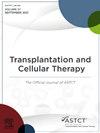ASTCT and USCLC Clinical Practice Recommendations for Allogeneic Stem Cell Transplant in Mycosis Fungoides and Sézary Syndrome
IF 3.6
3区 医学
Q2 HEMATOLOGY
引用次数: 0
Abstract
Mycosis fungoides (MF) and Sézary syndrome (SS) are the most common subtypes of cutaneous T-cell lymphoma (CTCL). While MF generally follows an indolent course, a subset of patients will experience progressive and/or treatment-refractory disease; Sézary syndrome is an aggressive lymphoma associated with high morbidity and mortality. Although allogeneic hematopoietic cell transplant (allo-HCT) is the only currently available potentially curative treatment modality for MF/SS there is no published guidance on referral criteria, transplant timing orallo-HCT approach. To develop consensus clinical practice recommendations, we performed a Delphi survey of 32 specialists in dermatology (n = 9), transplant hematology/oncology (n = 10), non-transplant hematology/oncology (n = 8), and radiation oncology (n = 5) from across the United States. Consensus required agreement of ≥75% of participants. Sixteen consensus statements were generated on four topics: (1) criteria for referral for consideration for allo-HCT, (2) allo-HCT preparative regimens and procedures (3) disease status at the time of allo-HCT, and (4) multidisciplinary management in the pre- and post-transplant settings. These clinical practice guidelines provide a framework for decision-making regarding allo-HCT for MF/SS and highlight areas for future prospective investigation.
ASTCT 和 USCLC 关于真菌病和塞扎里综合征异基因干细胞移植的临床实践建议。
导言:真菌病(MF)和塞扎里综合征(SS)是皮肤T细胞淋巴瘤(CTCL)最常见的亚型。霉形体病的病程一般比较缓慢,但也有一部分患者会出现进展性和/或难治性疾病。塞扎里综合征是一种侵袭性 CTCL,由于免疫受损和机会性感染,发病率和死亡率都很高。尽管异基因造血细胞移植(allo-HCT)是目前唯一可治愈 MF/SS 的治疗方式,并已被纳入 NCCN 和 ASTCT 治疗指南,但目前还没有关于转诊标准、时机和 allo-HCT 方法的公开指南来帮助指导临床医生治疗这些患者:对全美 32 名皮肤科(9 人)、移植血液/肿瘤科(10 人)、非移植血液/肿瘤科(8 人)和放射肿瘤科(5 人)的专家进行德尔菲调查。达成共识需要≥75%的参与者同意:结果:就四个主题达成了 16 项共识声明:1) 考虑接受同种异体肝移植的转诊标准;2) 同种异体肝移植的准备方案和程序;3) 同种异体肝移植时的疾病状态;4) 移植前后的多学科管理:这些临床实践指南为MF/SS的allo-HCT决策提供了一个框架,并强调了未来前瞻性研究的领域。
本文章由计算机程序翻译,如有差异,请以英文原文为准。
求助全文
约1分钟内获得全文
求助全文
来源期刊

Transplantation and Cellular Therapy
Medicine-Hematology
CiteScore
7.00
自引率
15.60%
发文量
1061
审稿时长
51 days
 求助内容:
求助内容: 应助结果提醒方式:
应助结果提醒方式:


